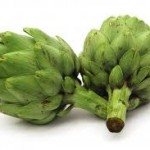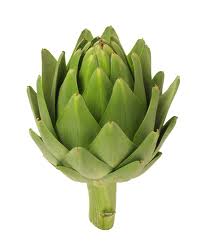Artichoke: Increases the flow of bile and detoxifies the liver. Other foods that act as hepatic tonics are loquats, cardoon also called the artichoke thistle. The total antioxidant capacity of artichoke flower heads is one of the highest reported for vegetables. Cynarin, an active chemical constituent in Cynara, causes an increased bile flow. The majority of the cynarin found in artichoke is located in the pulp of the leaves, though dried leaves and stems of artichoke also contain it. It inhibits taste receptors, making water (and other foods and drinks) seem sweet. Artichokes can also be made into an herbal tea. It affords some of the qualities of the whole vegetable, acting as a diuretic and improving liver function.
Medical Benefits:

- This diuretic vegetable is of nutritional value because of its exhibiting aid to digestion, strengthening of the liver, and gall bladder function, and raising of the HDL/LDL ratio.
- This reduces cholesterol levels, which diminishes the risk for arteriosclerosis and coronary heart disease.
- Aqueous extracts from artichoke leaves have also been shown to reduce cholesterol by inhibiting HMG-CoA reductase and having a hypolipidemic influence, lowering blood cholestoerl.
- Artichoke contains the bioactive agents apigenin and luteolin. C. scolymus also seems to have a bifidogenic effect on beneficial gut bacteria.
- Artichoke leaf extract has proved helpful for patients with functional dyspepsia, and may improve symptoms of IBS.
How to Cook and eat an Artichoke
- Reference
- Foods that Heal by George D. Pamplona-Roger, M.D.
- Wikipedia, the Free Encyclopedia

